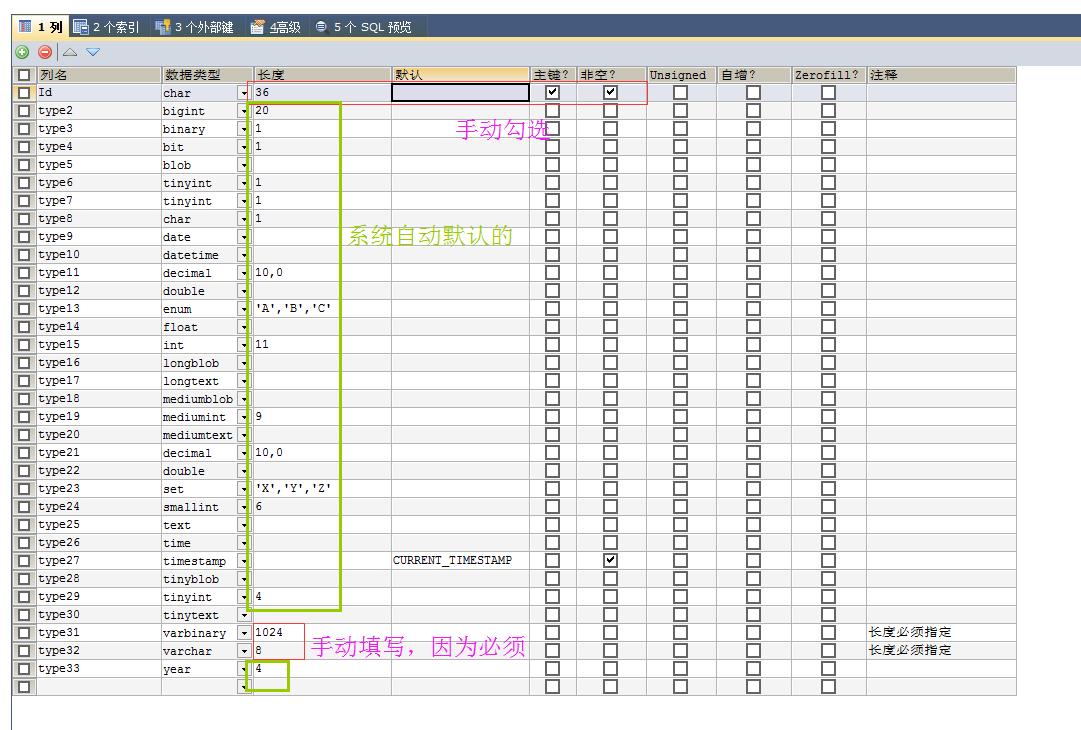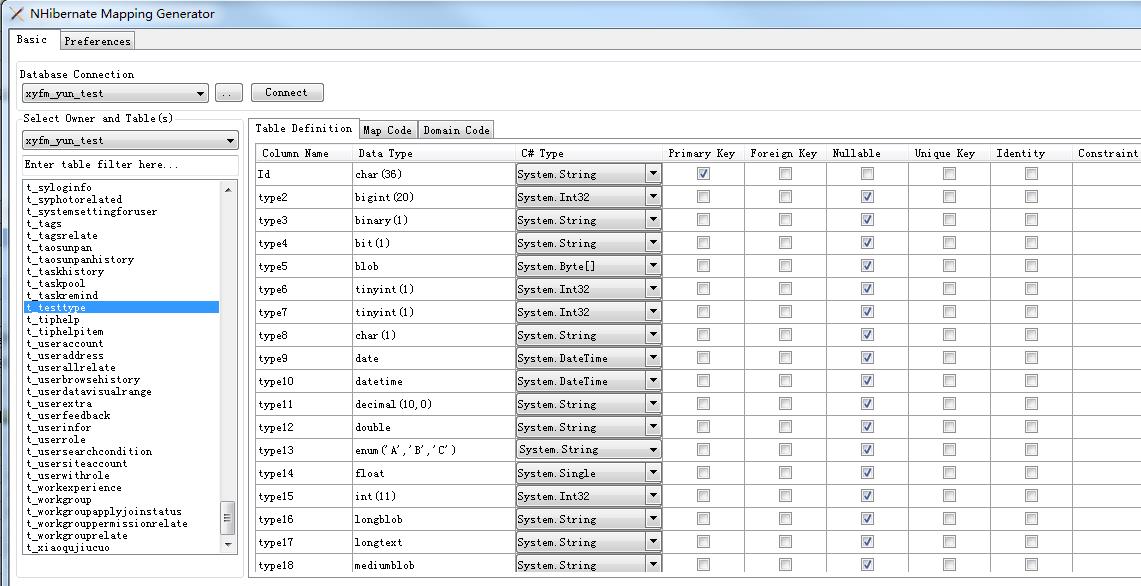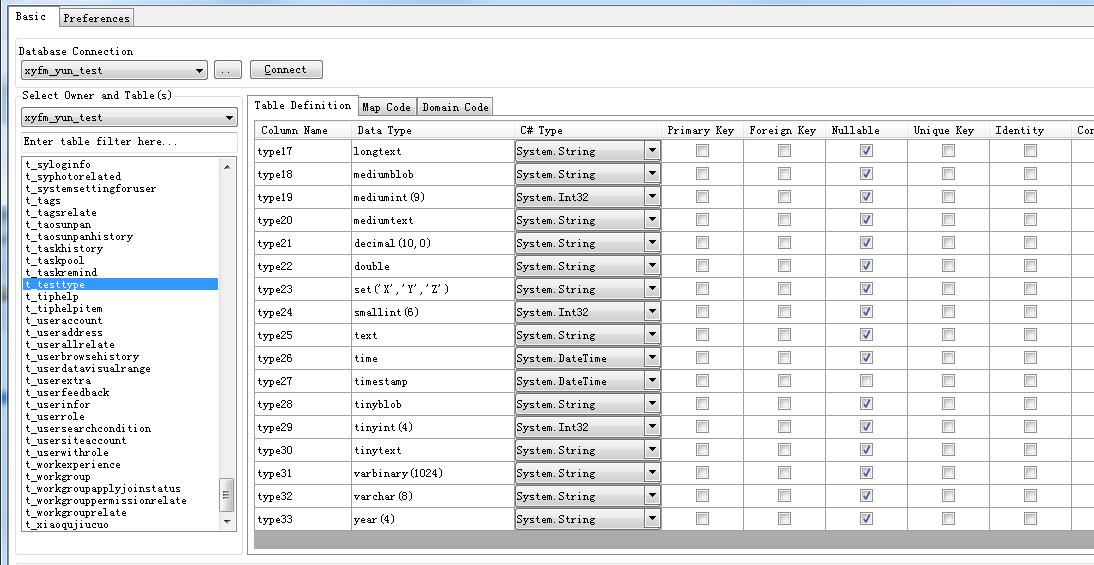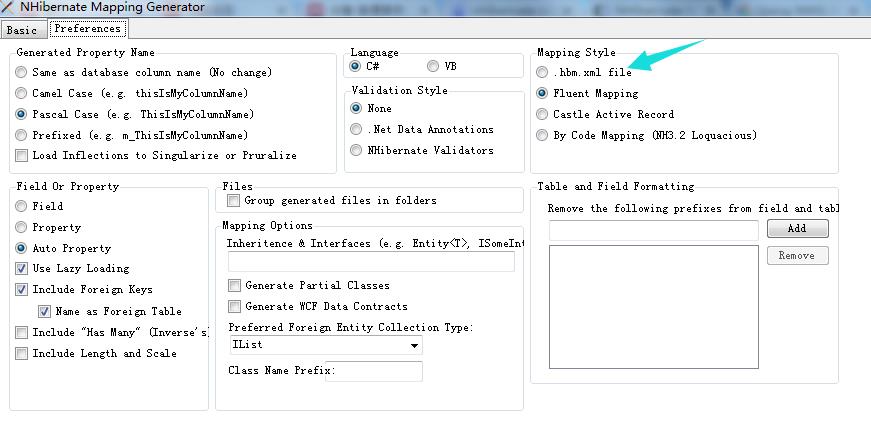Nhibernate + MySQL 类型映射
Posted 海阔天空XM
tags:
篇首语:本文由小常识网(cha138.com)小编为大家整理,主要介绍了Nhibernate + MySQL 类型映射相关的知识,希望对你有一定的参考价值。
用SQLyog工具创建表

然后用自动映射工具NHibernate Mapping Generator对表做自动映射,得到


这个是可视化界面,后面有对应的代码。
using System; using System.Collections.Generic; using System.Text; using FluentNHibernate.Mapping; using Sample.CustomerService.Domain; namespace Sample.CustomerService.Maps { public class TTesttypeMap : ClassMap<TTesttype> { public TTesttypeMap() { Table("t_testtype"); LazyLoad(); Id(x => x.Id).GeneratedBy.Assigned().Column("Id"); Map(x => x.Type2).Column("type2"); Map(x => x.Type3).Column("type3"); Map(x => x.Type4).Column("type4"); Map(x => x.Type5).Column("type5"); Map(x => x.Type6).Column("type6"); Map(x => x.Type7).Column("type7"); Map(x => x.Type8).Column("type8"); Map(x => x.Type9).Column("type9"); Map(x => x.Type10).Column("type10"); Map(x => x.Type11).Column("type11"); Map(x => x.Type12).Column("type12"); Map(x => x.Type13).Column("type13"); Map(x => x.Type14).Column("type14"); Map(x => x.Type15).Column("type15"); Map(x => x.Type16).Column("type16"); Map(x => x.Type17).Column("type17"); Map(x => x.Type18).Column("type18"); Map(x => x.Type19).Column("type19"); Map(x => x.Type20).Column("type20"); Map(x => x.Type21).Column("type21"); Map(x => x.Type22).Column("type22"); Map(x => x.Type23).Column("type23"); Map(x => x.Type24).Column("type24"); Map(x => x.Type25).Column("type25"); Map(x => x.Type26).Column("type26"); Map(x => x.Type27).Column("type27").Not.Nullable(); Map(x => x.Type28).Column("type28"); Map(x => x.Type29).Column("type29"); Map(x => x.Type30).Column("type30"); Map(x => x.Type31).Column("type31"); Map(x => x.Type32).Column("type32"); Map(x => x.Type33).Column("type33"); } } }
实体:
using System; using System.Text; using System.Collections.Generic; namespace Sample.CustomerService.Domain { public class TTesttype { public virtual string Id { get; set; } public virtual int? Type2 { get; set; } public virtual string Type3 { get; set; } public virtual string Type4 { get; set; } public virtual byte[] Type5 { get; set; } public virtual int? Type6 { get; set; } public virtual int? Type7 { get; set; } public virtual string Type8 { get; set; } public virtual DateTime? Type9 { get; set; } public virtual DateTime? Type10 { get; set; } public virtual string Type11 { get; set; } public virtual string Type12 { get; set; } public virtual string Type13 { get; set; } public virtual float? Type14 { get; set; } public virtual int? Type15 { get; set; } public virtual string Type16 { get; set; } public virtual string Type17 { get; set; } public virtual string Type18 { get; set; } public virtual int? Type19 { get; set; } public virtual string Type20 { get; set; } public virtual string Type21 { get; set; } public virtual string Type22 { get; set; } public virtual string Type23 { get; set; } public virtual int? Type24 { get; set; } public virtual string Type25 { get; set; } public virtual DateTime? Type26 { get; set; } public virtual DateTime Type27 { get; set; } public virtual string Type28 { get; set; } public virtual int? Type29 { get; set; } public virtual string Type30 { get; set; } public virtual string Type31 { get; set; } public virtual string Type32 { get; set; } public virtual string Type33 { get; set; } } }
第二种映射是通过xml映射文件来做的。

映射文件:
<?xml version="1.0" encoding="utf-8"?> <hibernate-mapping assembly="Sample.CustomerService" namespace="Sample.CustomerService.Domain" xmlns="urn:nhibernate-mapping-2.2"> <class name="TTesttype" table="t_testtype" lazy="true" > <id name="Id" column="Id" /> <property name="Type2"> <column name="type2" sql-type="bigint(20)" not-null="false" /> </property> <property name="Type3"> <column name="type3" sql-type="binary(1)" not-null="false" /> </property> <property name="Type4"> <column name="type4" sql-type="bit(1)" not-null="false" /> </property> <property name="Type5"> <column name="type5" sql-type="blob" not-null="false" /> </property> <property name="Type6"> <column name="type6" sql-type="tinyint(1)" not-null="false" /> </property> <property name="Type7"> <column name="type7" sql-type="tinyint(1)" not-null="false" /> </property> <property name="Type8"> <column name="type8" sql-type="char(1)" not-null="false" /> </property> <property name="Type9"> <column name="type9" sql-type="date" not-null="false" /> </property> <property name="Type10"> <column name="type10" sql-type="datetime" not-null="false" /> </property> <property name="Type11"> <column name="type11" sql-type="decimal(10,0)" not-null="false" /> </property> <property name="Type12"> <column name="type12" sql-type="double" not-null="false" /> </property> <property name="Type13"> <column name="type13" sql-type="enum(\'A\',\'B\',\'C\')" not-null="false" /> </property> <property name="Type14"> <column name="type14" sql-type="float" not-null="false" /> </property> <property name="Type15"> <column name="type15" sql-type="int(11)" not-null="false" /> </property> <property name="Type16"> <column name="type16" sql-type="longblob" not-null="false" /> </property> <property name="Type17"> <column name="type17" sql-type="longtext" not-null="false" /> </property> <property name="Type18"> <column name="type18" sql-type="mediumblob" not-null="false" /> </property> <property name="Type19"> <column name="type19" sql-type="mediumint(9)" not-null="false" /> </property> <property name="Type20"> <column name="type20" sql-type="mediumtext" not-null="false" /> </property> <property name="Type21"> <column name="type21" sql-type="decimal(10,0)" not-null="false" /> </property> <property name="Type22"> <column name="type22" sql-type="double" not-null="false" /> </property> <property name="Type23"> <column name="type23" sql-type="set(\'X\',\'Y\',\'Z\')" not-null="false" /> </property> <property name="Type24"> <column name="type24" sql-type="smallint(6)" not-null="false" /> </property> <property name="Type25"> <column name="type25" sql-type="text" not-null="false" /> </property> <property name="Type26"> <column name="type26" sql-type="time" not-null="false" /> </property> <property name="Type27"> <column name="type27" sql-type="timestamp" not-null="true" /> </property> <property name="Type28"> <column name="type28" sql-type="tinyblob" not-null="false" /> </property> <property name="Type29"> <column name="type29" sql-type="tinyint(4)" not-null="false" /> </property> <property name="Type30"> <column name="type30" sql-type="tinytext" not-null="false" /> </property> <property name="Type31"> <column name="type31" sql-type="varbinary(1024)" not-null="false" /> </property> <property name="Type32"> <column name="type32" sql-type="varchar(8)" not-null="false" /> </property> <property name="Type33"> <column name="type33" sql-type="year(4)" not-null="false" /> </property> </class> </hibernate-mapping>
没什么内容,只是记录一下,因为在做映射的时候,都不知道怎么匹配类型,这里可以做个参考。
以上是关于Nhibernate + MySQL 类型映射的主要内容,如果未能解决你的问题,请参考以下文章
哪种 .NET 数据类型最适合在 NHibernate 中映射 NUMBER Oracle 数据类型?